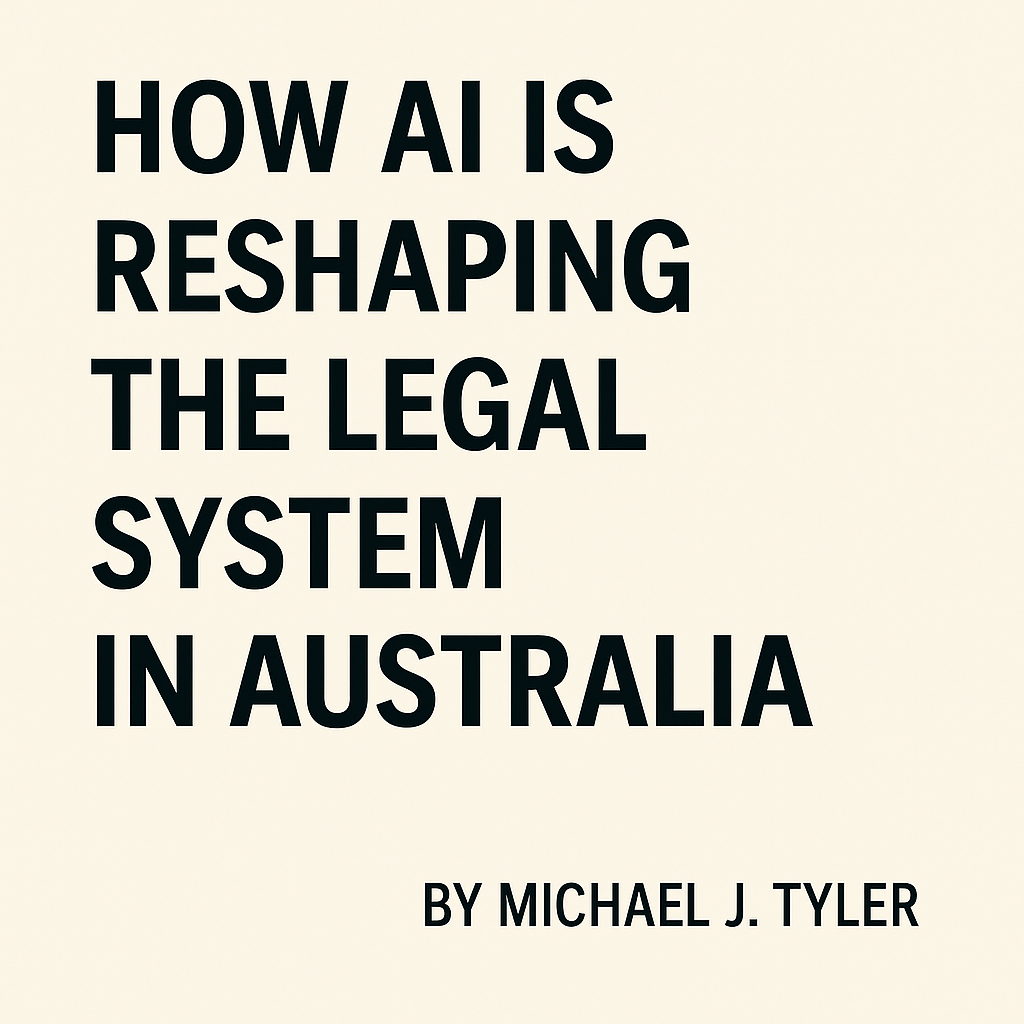
By Michael J. Tyler
As artificial intelligence (AI) rapidly transforms the global landscape, Australia stands at the edge of a profound shift in how legal services are delivered, accessed, and understood. The legal profession; often perceived as tradition bound and resistant to change is now being challenged to evolve or risk becoming obsolete in some of its conventional forms.
This evolution, driven by AI, is not a distant hypothetical. It’s happening now, and the future of law in Australia is already being written by the algorithms, automation, and augmented intelligence that are reshaping legal practice, dispute resolution, and justice delivery.
The End of the Billable Hour?
The traditional time based billing model is increasingly being questioned not only by clients but also by the tools that make time-intensive tasks irrelevant. AI-driven legal research tools can now perform in seconds what used to take junior lawyers hours or even days. Document review, discovery, and contract analysis are all becoming largely automated.
In response, firms are moving toward fixed-fee and value-based pricing models. Clients are demanding cost certainty, and AI is making it feasible. Law firms in Australia must adapt, not just by adopting AI tools, but by redesigning their service models around them.
AI as a Legal Collaborator
Far from replacing lawyers wholesale, AI is emerging as a powerful collaborator. In family law, for example, AI tools can assist mediators and family dispute resolution practitioners in assessing risk, predicting outcomes, and supporting fair settlements. In commercial law, AI is streamlining due diligence and risk analysis, giving lawyers more time to focus on strategy and human judgment.
The lawyer of the future is not replaced by AI but rather empowered by it. Australian legal education must therefore evolve to include not just the study of law but also data ethics, algorithmic accountability, and digital literacy.
Democratisation of Legal Services
One of the most exciting prospects is the democratisation of law. AI-driven platforms are already delivering affordable legal advice to underserved populations. From chatbots answering tenancy rights queries to AI mediators assisting in property settlements, Australians who previously faced cost, location, or language barriers may now access justice more equitably.
The future holds the potential for a true “legal health system” where early intervention, legal triage, and self-service platforms support Australians before disputes escalate to litigation. AI will be the triage nurse of legal conflict, guiding people to the right service at the right time.
Regulation and Ethical Dilemmas
Yet the rise of AI in law is not without serious risks. Who is accountable for the advice of an AI? What happens when algorithms absorb and replicate biases from training data? How do we ensure that AI doesn’t just entrench systemic inequality under the guise of efficiency?
Australia will need robust regulatory frameworks to ensure transparency, auditability, and fairness in AI-driven legal services. The Law Council of Australia and state-based regulators must play a proactive role in developing ethical AI standards, just as they uphold human professional standards.
Courtrooms and AI Justice
AI also has the potential to assist judges with decision support tools offering case summaries, precedent analysis, or sentencing benchmarks. Some international jurisdictions are already experimenting with predictive analytics in bail and parole decisions.
However, Australia must tread carefully. The principle of open justice demands that legal reasoning be transparent, not black boxed. There is a fine line between support and substitution. AI should inform but never replace human judicial decision-making.
What’s Next?
As we look forward, the Australian legal sector must do more than merely adopt AI tools. It must ask:
- How can we design AI to reinforce fairness, not just efficiency?
- How can we train tomorrow’s lawyers to lead ethical innovation?
- How do we protect vulnerable Australians in an increasingly automated system?
The law is not a static code it is a living framework that must serve people. In an AI-driven future, our challenge is not simply to make the law faster or cheaper, but more just.
Australia has the talent, technology, and legal tradition to lead the world in human-centred legal innovation. Let’s ensure that AI becomes a bridge not a barrier to a more accessible and equitable legal system.
Michael J. Tyler is a mediator, educator, and commentator on the intersection of law, technology, and social equity in Australia.